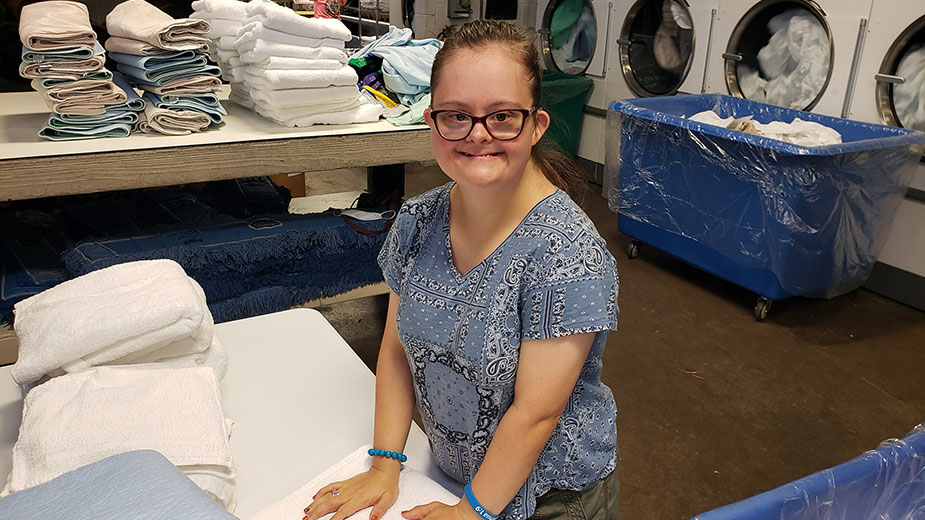YOUNGSTOWN, Ohio – The employment rate for adults with developmental disabilities has risen over the past decade as Ohio continues to guide them into the workforce instead of sheltered workshops.
“In my 30 years, I have seen a pretty big evolution in our service delivery system,” says Bill Whitacre, superintendent of the Mahoning County Board of Developmental Disabilities. “When I first came here in the early ’90s, the traditional model was individuals that we support would go on to an adult day program or sheltered workshop [after finishing school].”
The rise in the job rate reflects a change of philosophy that was codified in 2012 when then-Gov. John Kasich signed Ohio’s Employment First Initiative.
The labor shortage that emerged from the pandemic also is playing a role in job creation, as employers became aware of the developmentally disabled as a source of workers.
According to the U.S. Department of Labor, persons with disabilities ages 16-24 had a labor force participation rate of 39% in 2022 and an unemployment rate of 5.4%. In 2021, the labor force participation for that same age group was 35.1% and the unemployment rate was 10.8%.
Before 2012, some individuals would be referred for employment services, but not nearly as much as now, says Whitacre, who agrees with the new direction.
“They should not be going to a sheltered workshop or day program,” he says. “Not to say that those programs are not viable. They are still needed for some individuals. But we should be working as hard as possible and do as much as we can to help individuals [get into the workforce] once they finish with their schooling.”
The Mahoning County Board of Developmental Disabilities currently has 62 individuals in competitive community employment. Helping them keep their jobs is a priority.
“Historically, individuals with disabilities had poor employment outcomes,” Whitacre says. “Maybe people would get a job but couldn’t keep it.”
To combat this situation, MCBDD now builds in supports such as job coaching to help its clients maintain employment. It also is smoothing the transition into the workforce by preparing clients before they graduate.
“We as a board of DDs are trying to get involved with people in school at about age 14, to start talking about what their dreams and aspirations are,” he says. “[We] speak to the individuals, we speak to the parents, and try to craft a plan to see how we can help them move forward once they are done with school.”
RANGE OF JOBS
One silver lining to the pandemic is that the labor shortage has made employers more open to hiring those with developmental disabilities.

“It has opened up opportunities for individuals because the employers are maybe opening their eyes to a subset of a workforce that they weren’t aware of before,” Whitacre says. “It has become more apparent that those with disabilities can contribute in the workforce and it has made companies look in different places now.
While Whitacre says MCBDD does serve a lot of people in retail or fast-food work, there are all types of jobs those with developmental disabilities can perform. “We also serve people who go on to college and get their master’s degree,” he says. “It is a wide range across the spectrum as far as different industries.”
Through its business advisory council, Whitacre’s organization tells business owners about the benefits of hiring individuals with disabilities. “We’re doing everything that we can to open the business community’s eyes in the surrounding counties,” he says.
Whitacre says he has learned it is important to build relationships with public school systems and start working with children early on. “They are doing all they can to educate these kids on a day-to-day basis. We can walk alongside them throughout that transition process, introducing them to what life would be like after graduating from school,” he says.
“It’s like any of us,” says Whitacre. “It’s not, ‘We are the professionals, and we think this is what you’re capable of.’ Let’s open our eyes and do a true assessment of what they want to do, what they believe they’re capable of and what we can do to help them get there.”
Whitacre says any business owner feeling the labor squeeze should go to MahoningDD.org or call the organization, which will connect them with potential employees.
MASCO PLAYS A ROLE
Mahoning County Adult Services Co. is another organization that helps adults with developmental disabilities meet vocational services.
The nonprofit, founded in 1967, provides employment for nearly 275 Mahoning County residents.
“We are a Medicaid provider on the human services side,” says Phillip Miller, CEO of MASCO. “It’s an interesting mix of business and human services.”
The organization was previously operated by the MCBDD, but after Medicaid mandated county boards to get out of direct services and switch to a case management function, the company privatized.
Some of the more common jobs the company fills involve sorting, packaging, inspection and assembly work.
“It tends to be projects that are outside of the strengths of a company,” says Miller. “It’s [often] something they don’t want to do internally and they need a partner. We become that partner.”
Miller says the state wants to integrate the developmentally disabled into the community. “That can mean in their work life, or their social life or whatever things they have interest in doing,” he says. “We support that.”
But not all individuals want jobs in the community. In those cases, MASCO directly provides employment opportunities.
“We become a safe landing for people that might lose their job or are looking for something else,” he says. “We can bring them in here and they can work here.”
Primary funding for MASCO comes from Medicaid and county board match funds. The businesses the company works with are also charged.
Miller says he has seen a lot of success during his time with MASCO.
“It is exciting to see that,” he says. “Our staff goes through a lot of training to be qualified to deliver services. We impact peoples lives in a positive way every single day here.”
GOODWILL INDUSTRIES
Some local companies that help those with disabilities, including Goodwill Industries, create employment through their internal programs.
Joe Paloski, vice president of mission services at Youngstown Area Goodwill Industries Inc., says his organization helps individuals find jobs and advance in their field.
“Employment provides many benefits ranging from being a source of income to creating a sense of purpose,” he says.
Paloski says there is always a need to provide jobs to those with employment barriers.
“These barriers include both disabilities and disadvantaging conditions, and may prevent someone from working or have an effect on how people work,” he says.
Youngstown Area Goodwill Industries employs 311 with positions in administration, business services, mission history and retail work.
“Many employers are understaffed and in need of new strategies to find workers,” says Paloski. “We have been successful in helping people with barriers obtain jobs while at the same time expanding recruitment opportunities for employers.”
Pictured at top: Marlena Timmerman is employed at D&D Industrial Services in Boardman.
